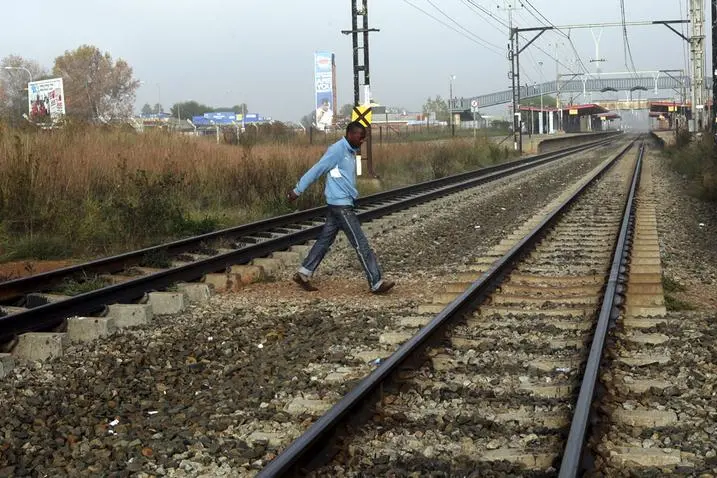PHOTO
By Megha Merani
DUBAI, March 7 (TRPN) - The six-nation Gulf Cooperation Council (GCC) is studying the establishment of a regulator for a stalled regional rail network, a Saudi Arabian rail official said on Tuesday.
The 2,177-kilometer GCC Rail project, which has been delayed from its initial 2018 completion date, aims to connect Saudi Arabia, the United Arab Emirates, Kuwait, Qatar, Bahrain and Oman.
"We (GCC) are conducting a feasibility study for that regulator and I think that the indication is we are going towards establishing such a body to ensure the safety and the integration of all the national networks," Dr Rumaih Al Rumaih, president of Saudi Arabia's Public Transport Authority and of Saudi Railways Organization (SRO), told Zawya Projects on the sidelines of the Middle East Rail conference in Dubai.
He did not provide a timeline or further details.
A GCC Secretariat official had told the conference that the bloc was studying the possibility of setting up a centralized body to supervise and regulate the regional rail network.
"There has been a decree by the GCC Council to work on moving the project towards execution phase and study creating a institute ....that would supervise the project ...in cooperation with the national railway companies of the council," Dr Abdul Latif bin Rashid Al Zayani, secretary general of the GCC Secretariat General, said in a speech.
The UAE Minister of Infrastructure Development Abdullah Belhaif al-Nuaimi said last month that the bloc was committed to the project and would discuss the likelihood of constructing the passenger and cargo network by 2021 at a meeting of regional ministers in April, according to a Reuters report.
In March 2015, trade magazine International Railway Journal, reporting from the GCC Metro and Rail conference in Muscat, said a study is underway to establish a regulatory authority for the GCC railway and that the Secretariat General has been acting as a project manager for the rail alliance. The report said a regional authority would benefit the project by centralizing procurement to reduce costs and address operational challenges.
The project has faced obstacles and stalled after the sharp drop in oil prices that started in mid-2014 hit government revenues in the oil-exporting region.
The UAE has suspended further construction of its project while Oman has shifted concentration to building a domestic network linking the ports of Salalah, Sohar and Duqm, according to Reuters. Bahrain has said it would not connect its network to Saudi Arabia until at least 2023.
(Additional reporting by Yasmine Saleh) ((megha.merani@thomsonreuters.com;yasmine.saleh@thomsonreuters. com))
DUBAI, March 7 (TRPN) - The six-nation Gulf Cooperation Council (GCC) is studying the establishment of a regulator for a stalled regional rail network, a Saudi Arabian rail official said on Tuesday.
The 2,177-kilometer GCC Rail project, which has been delayed from its initial 2018 completion date, aims to connect Saudi Arabia, the United Arab Emirates, Kuwait, Qatar, Bahrain and Oman.
"We (GCC) are conducting a feasibility study for that regulator and I think that the indication is we are going towards establishing such a body to ensure the safety and the integration of all the national networks," Dr Rumaih Al Rumaih, president of Saudi Arabia's Public Transport Authority and of Saudi Railways Organization (SRO), told Zawya Projects on the sidelines of the Middle East Rail conference in Dubai.
He did not provide a timeline or further details.
A GCC Secretariat official had told the conference that the bloc was studying the possibility of setting up a centralized body to supervise and regulate the regional rail network.
"There has been a decree by the GCC Council to work on moving the project towards execution phase and study creating a institute ....that would supervise the project ...in cooperation with the national railway companies of the council," Dr Abdul Latif bin Rashid Al Zayani, secretary general of the GCC Secretariat General, said in a speech.
The UAE Minister of Infrastructure Development Abdullah Belhaif al-Nuaimi said last month that the bloc was committed to the project and would discuss the likelihood of constructing the passenger and cargo network by 2021 at a meeting of regional ministers in April, according to a Reuters report.
In March 2015, trade magazine International Railway Journal, reporting from the GCC Metro and Rail conference in Muscat, said a study is underway to establish a regulatory authority for the GCC railway and that the Secretariat General has been acting as a project manager for the rail alliance. The report said a regional authority would benefit the project by centralizing procurement to reduce costs and address operational challenges.
The project has faced obstacles and stalled after the sharp drop in oil prices that started in mid-2014 hit government revenues in the oil-exporting region.
The UAE has suspended further construction of its project while Oman has shifted concentration to building a domestic network linking the ports of Salalah, Sohar and Duqm, according to Reuters. Bahrain has said it would not connect its network to Saudi Arabia until at least 2023.
(Additional reporting by Yasmine Saleh) ((megha.merani@thomsonreuters.com;yasmine.saleh@thomsonreuters. com))





















